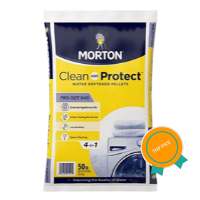How Do Water Softeners Salts Work?
For salt-based water softeners, the main catalyst is salt.
Hard water is generated into soft water via an ion exchange process. Instead of eliminating unwanted impurities in your water, this system instead swaps it! The process occurs in the brine tank through resin beads. These resin beads are washed with a salt solution.
On coming in contact with hard water, the hardness ions are swapped with the salt ions coated on the resin beads. This in turn makes the water soft.
Resin beads do not have a lifelong capacity, there’s a certain period during which they function at the optimum level. Therefore, resin beads need to recharge their functioning capacity from time to time. This is why using good quality salt is important.
Good quality salt reduces the level of impurities in your water softener tank, decreasing maintenance costs and responsibilities. Resin beads are recharged by refilling your brine tank with crystals, salts, and pellets every two months on average.
They can resume working at their regular efficient capacity to ensure your house gets a consistent supply of soft water on restoration.
So the primary catalyst, salt, is essentially preventing scaling on water-based appliances and other household items. Furthermore, soft water keeps your skin hydrated and prevents your clothes from losing their color.
Best Salt For Water Softener Comparison
| Image | PRODUCT/ Features | Rating | |
|---|---|---|---|
Top Pick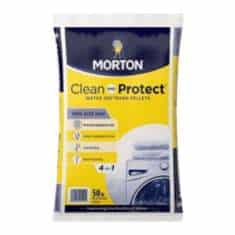 |
Morton 40-D System Water Softener PelletsType: Pellets Features: Improves the taste of water Price: $ Weight: 50 Pounds |
|
Read Full Review |
Iron Pick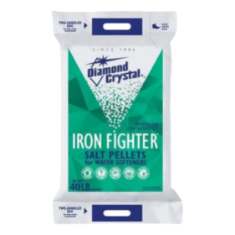 |
Diamond Crystal Iron Fighter PelletsType: Pellets Features: Made for water with high iron concentration levels Price: $$ Weight: 40 Pounds |
|
Read Full Review |
Rust Protection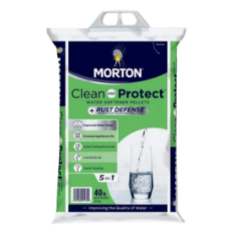 |
Morton Rust Defence Water Softener PelletsType: Pellets Features: 15 times more effective than normal salt Price: $ Weight: 40 Pounds |
|
Read Full Review |
Potassium Chloride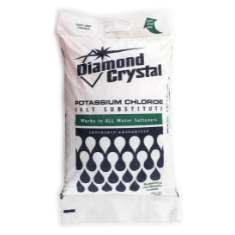 |
Diamond Crystal Potassium Chloride CrystalsType: Crystals Features: Made with a sodium concentration Price: $$ Weight: 40 Pounds |
|
Read Full Review |
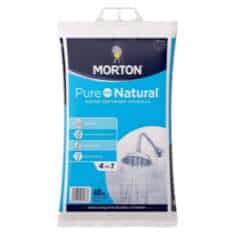 |
Morton 40E Solar SaltType: Crystals Features: Natural water softener salt Price: $ Weight: 40.5 Pounds |
|
Read Full Review |
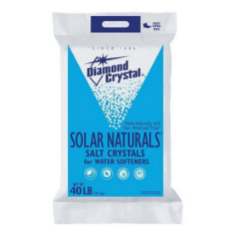 |
Cargill Salt 7304 CrystalsType: Crystals Features: Multiple benefits aside from water softening; hides curing and curing pickles Price: $$ Weight: 40 Pounds |
|
Read Full Review |
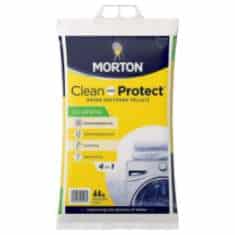 |
Morton System Saver II Salt PelletsType: Pellets Features: Helps extend the lifespan of water appliances Price: $$ Weight: 44.5 Pounds |
|
Read Full Review |
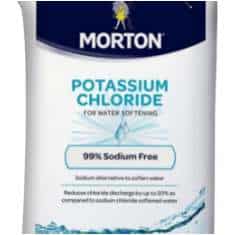 |
Morton Potassium Chloride PelletsType: Pellets Features: Up to 99% sodium-free Price: $$ Weight: 40 Pounds |
|
Read Full Review |
1. Morton 40-D System Water Softener Pellets
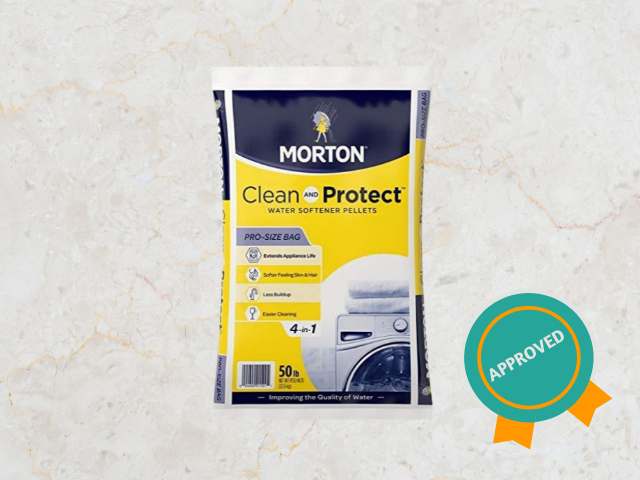
The Morton 40-D salt pellets are a great option if you want salt pellets in a larger quantity.
Not only will this help your water softening system run efficiently, but these pellets are specifically tailored to take care of your appliances.
Lesser buildup means your household items and water appliances will be easier to clean than before. You won’t spend more on cleaners and detergents because you won’t use twice the amount you initially did.
Most importantly, these salt pellets eliminate another major consequence of hard water minerals. With the help of the ion exchange process, sodium ions remove hard water ions thus stopping your appliances from losing their work-life!
Specifications
- Item Dimensions: 16 inches x 15 inches x 4 inches
- Item Model: Morton 40-D
- Item Weight: 50 Pounds
- Color: White
- Batteries Needed: None
Features
- Aids in easier cleaning
- Increases life expectancy of appliances
- Results include softer hair and skin
The means of application are also fairly simple since all you have to do is keep your tank at least half full at all times. During this make sure you’re monitoring your salt levels consistently.
Since they come in a 50-pound bag, these pellets last a long time, only needing to be used every two months or so!
Customer Rating: 4.5 out of 5 stars
+ Lessens soap and detergent costs
+ Helps appliances last longer
+ Eliminates dryness from scalp and skin
2. Diamond Crystal Iron Fighter Pellets
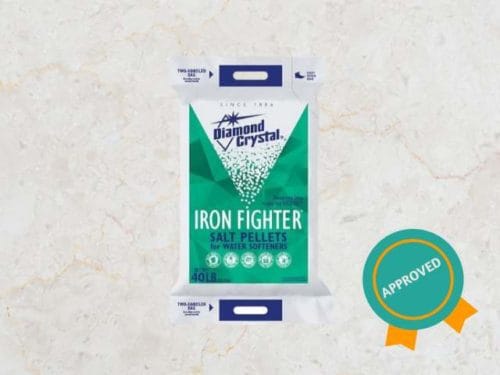
Scaling is problematic but so are rust stains. Diamond crystal pellets are specifically made to fight rust stains left behind due to iron in hard water.
These iron fighter pellets simultaneously stop scaling and rust forming on tubs, sinks, appliances, and pipes.
For your water softening system to run smoothly, brine tank maintenance is equally necessary. These diamond crystal iron fighter pellets are formulated to do that automatically!
Salt bridges are a menace if not taken care of properly, which makes them harder to clean! Diamond crystal pellets also stop salt bridges from forming. Thus preventing additional costs that may occur in plumbing maintenance.
Specifications
- Item Dimensions: 4 inches x 16 inches x 24 inches
- Item Model: Diamond Crystal Iron Fighter
- Item Weight: 40 Pounds
- Color: White
- Batteries Needed: None
Features
- Up to 99.6% pure salt.
- 100% water soluble
- Eliminates salt bridges and salt mushing
- Two-handle bags; easier to lift and carry
- Certified by the NSF
Customer Rating: 4 out of 5 stars
+ Keeps your brine tank safe
+ Works with most water softening systems
+ Increases longevity of water softening systems
+ Easier to maintain
3. Morton Rust Defence Water Softener Pellets
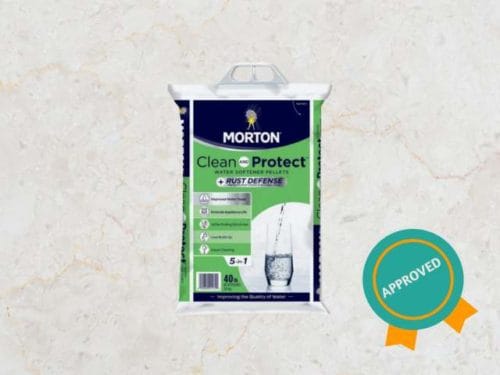
Water softeners shouldn’t only produce soft water but should also reduce the scale problem your household items face due to hard water.
Water hardness, when removed, may leave behind an unpleasant taste. To combat a higher iron concentration, improve taste and remove stains, Morton Rust Defence pellets are the best option!
Morton Rust Defence pellets give you optimum saltwater quality. These pellets are up to 15 times more effective than plain salt.
These guarantee to keep rust and stains off your bathtubs, sinks, appliances, and washing machines. These pellets are most suited for high iron water content and to improve the taste of soft water.
Specifications
- Item Dimensions: 19 inches x 13 inches x 4 inches
- Item Model: Morton-Rust-40
- Item Weight: 40 Pounds
- Color: Plain
- Batteries Needed: None
Features
- Up to 15 times more effective
- Includes a well-built plastic bag
- Easy to carry, pour and lift
The application requires using two bags of pellets every two months. Keep an eye on the salt levels in the brine tank making sure it’s half full at all times.
Using two bags every two months means a monthly cost of approximately $15 per month!
Customer Rating: 4.4 out of 5
+ Easy to handle
+ 15 times more effective than normal salt
+ Low water solubility
+ Eliminates rust stains
+ Eliminates scale and buildup
4. Diamond Crystal Potassium Chloride Crystals
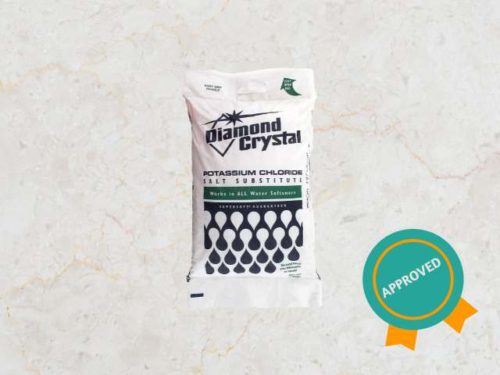
Water softener potassium chloride crystals are an effective substitute for sodium chloride.
Made with almost completely pure potassium chloride, these softener crystals work as smoothly as a salt-based water softener salt.
They work as well as a sodium salt-based water softener, with potassium removing calcium and magnesium ions instead of sodium.
These Cargill salt crystals are the option to go for especially if you don’t like the residing taste of pure sodium chloride in your water softener.
These 40-pound bags are required for use every two months. The crystals perform like normal sodium chloride water softener crystals.
On average with a price of $45 per month, these are one of the few water softener maintenance costs you need to keep in mind!
Specifications
- Item Dimensions: 4.35 inches x 16 inches x 24 inches
- Item Model: Potassium Chloride-40
- Item Weight: 40 Pounds
- Color: White
- Batteries needed: None
Features
- Contains 99.1% pure potassium chloride
- Low solubility levels
- Two-handle bags
- Easy to pour and carry
Customer Rating: 4.8 out of 5 stars
+ Efficient salt substitute
+ Reduces brine tank residue
+ Certified by the NSF
+ Available in multiple packs
+ Usable in all kinds of water softeners
+ Highest customer reviews
5. Morton 40E Solar Salt Crystals
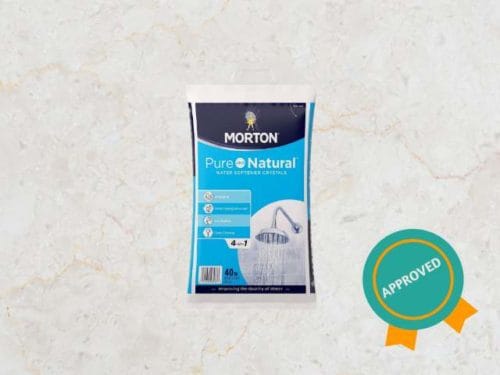
These are solar salt crystals. This makes them all-natural and pure water softener crystals.
Solar salt pellets or crystals are formed through solar evaporation of sea salt or any type of salt brine solution.
The brine solution is exposed to sunlight through which evaporation occurs, leaving pure solar salt crystals behind.
Solar salt evaporation gets rid of any insoluble impurities which prevent your brine tank from accumulating buildup. This helps to maintain your water softener’s brine tank.
While the regeneration cycle takes place, it’s the brine that washes away calcium and magnesium ions.
For your water softener system to continue working, these crystals also stop hard water scaling.
Furthermore, solar salt crystals prevent mineral buildup in pipes and appliances because of their all-natural quality.
Specifications
- Item Dimensions: 12 inches x 25 inches x 3.5 inches
- Item Model: Morton-40E
- Item Weight: 40.5 Pounds
- Color: White
- Batteries Needed: None
Features
- Natural water softener salt
- Special bag features
- Includes well-built plastic handle
- Easy to tear and use
As required with other Morton salt products, the solar salt 40E crystals should be used every two months.
Keeping an eye that your brine tank solution should be at least half full at all times, two packets of 40E solar salts crystals are sufficient!
Customer Rating: 4.4 out of 5 stars
+ All-natural salt
+ Prevents hard mineral buildup
+ Makes cleaning easier
+ Helps in attaining softer skin and hair
6. Cargill Salt 7304 Crystals
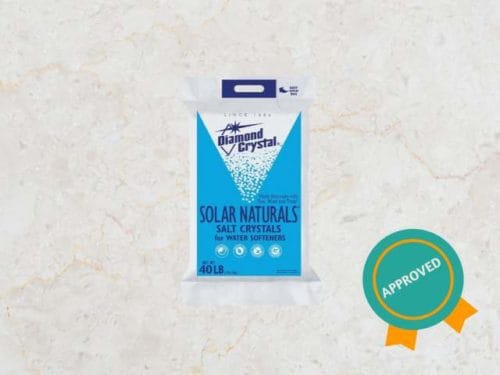
We wholeheartedly recommend the Cargill Crystals due to their multifunctional use. You get additional benefits besides water softening benefits for a cost between $21-$25 only!
Cargill water softening salt is primarily intended to aid water softeners. You can use these salt crystals for both home-based and commercial systems.
Cargill 7304 crystals have no wastewater impurities making them a viable option for your water softener.
The pure crystalline sodium chloride salt crystals, used in brine form have other benefits besides a water softener cleaner.
These crystals efficiently work during the ion exchange process and help resin beads last longer due to their lack of impurity.
Customer reviews concur that these crystals are a better option compared to rock salt. They also prevent salt bridges and salt mushing!
Specifications
- Item Dimension: 3.8 inches x 16 inches x 24 inches
- Item Model: Cargill 7304
- Item Weight: 40 Pounds
- Color: White
- Batteries Needed: None
Features
- Easy to open salt bags
- Require no salt channeling
- More efficient than rock salt
Customer Rating: 4.4 out of 5 stars
+ Brine form can be used for processing poultry and meat
+ Brine form can be used to cure pickles and olives
+ Can be used in hide curing
+ Polyethylene packages provide moisture protection
+ Can be used to quality grade vegetables
7. Morton System Saver II Salt Pellets
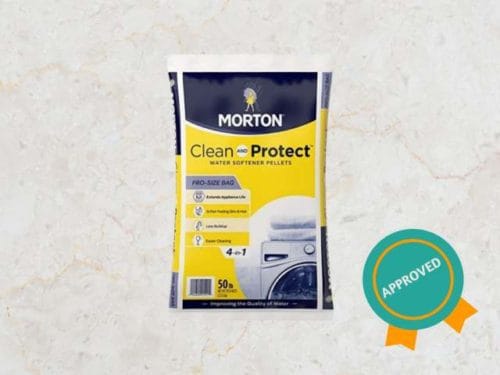
If you’re a big household, it means you use more water. This also means that your water softener needs a higher capacity.
If you’re looking for a variety of sizes, the Morton system saver pellets are the way to go!
Morton salt pellets are one of the best water softening salts as depicted by the countless water softener salt reviews!
Available in at least 4 different sized packagings, these pellets have a patented formula specifically designed to prevent calcium and magnesium scale buildup. These pellets work smoothly to give you a clean supply of soft water too!
Morton system saver II pellets guarantee the elimination of scaling, making it easier to clean your appliances and prevents water clogging in pipes.
Specifications
- Item Dimensions: 21.5 inches x 15 inches x 4.49 inches
- Item Model: Morton-40C
- Item Weight: 44.5 Pounds
- Color: White
- Batteries Needed: None
Features
- Specific bag features
- Includes sturdy plastic handles
- Easy to carry
- Easy to tear open and pour
Soft water generated by the Morton system saver pellets will save you time and money.
this water softening salt is necessary to acquire because it reduces your plumbing maintenance costs and decreases the use of detergents and soaps.
Customer Rating: 4.5 out of 5 stars
+ Removes stains off of tub, sinks, pipes, etc
+ Available in 25, 40, and 44-pound bags
+ Extends the life of water heaters
+ Improves the efficiency of water-based systems
+ Recommend by renowned companies like Whirlpool and Ecopure
8. Morton Potassium Chloride Pellets
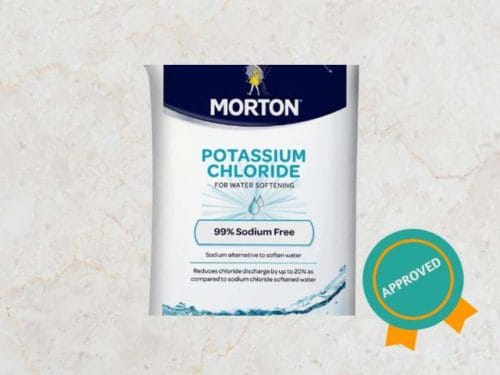
If you’re an avid user of Morton salt but want a different sodium-free alternative, these pellets are just that!
If you think potassium chloride will reduce the working capacity of resin beads and the regeneration cycle, these pellets guarantee you the opposite.
These are 99% sodium-free which will lessen the overwhelming taste salt-based softeners sometimes leave behind.
This is one of the best salts for your water softener systems since they remove mineral buildup through a salt-less alternative.
The regeneration cycle consistently discharges whatever brine solution is added to the brine tank. These potassium pellets reduce chloride discharge by up to 20%. This will lessen the amount of potassium chloride needed and save on annual salt costs.
Specifications
- Item Dimensions: 20 inches x 16 inches x 6 inches
- Item Model: Potassium Chloride-40
- Item Weight: 40 Pounds
- Color: White
- Batteries needed: None
Features
- Specific bag features
- Easy to carry
- Easily torn and poured
- Special plastic handles
Like all Morton salt, these potassium chloride pellets are the best water softener salt.
Make sure your brine tank level is always half and you’ll only need to use two packets of these pellets every two months!
Before purchasing these potassium chloride pellets, make sure you take into account the annual salt costs you’ll have, depending on the size and packaging.
Customer Rating: 4.6 out of 5 stars
+ Remove scaling
+ Extend the life of water-based appliances
+ Highest rating out of Morton based salts
+ Gives no strong aftertaste
+ Suitable for any water softener system
+ Improves the efficiency of water-based appliances
+ Lowers maintenance costs
+ Gives softer hair and skin
How Can You Tell If Your Water Softener Needs Salt?
At this point, you’ve understood how essential salt is for a water softener. Salt-based water softeners especially, function only through salt.
This is why you must equip yourself with adding the right and the best type of salt to your water softeners.
Before you purchase salt for your softeners, you need to keep a few factors in mind:
- The kind of water softener you have
- The capacity of your brine tank
- The level of water hardness in your area
- Your household water use
Knowing when your water softener needs more salt depends on the factors below:
The Inside Of Your Tank
By determining how much salt the water softening process requires, you need to maintain your tank’s salt level accordingly.
Remove your tank’s cover to see the level of salt within it. One of the most necessary water softener maintenance tips is to always keep the tank half full. If the tank appears to be half empty, refill it until it’s just over half.
If the salt appears dry, that is also another indication to refill your brine tank salt levels. However, even if the water level is above the salt level or the salt seems wet, this is another indicator to refill the tank to half.
How Long You’ve Had Your Water Softener
A water softener requires regeneration to work at the highest capacity. This is dependent on how long you’ve had your water softener system. The newer the water softening system, the higher its efficiency.
If you’ve had your water softener system for over 10 years, your water softener may require more salt than it initially did.
A new water softener system needs salt refilling every six to eight weeks. However, a more aged system will require constant checkups on the brine tank levels.
Level Of Salt Bridging
Another reason to maintain your water softeners is to keep an eye out for bridging. If not caught early on salt bridging negates the purpose of a water softener.
Salt bridges form due to consistent salt clumps which stop your water softener from getting salt. Salt bridges occur if the salt level in the brine tank falls or when you no longer get a soft water supply.
To avoid problematic situations caused by bridging, keep your water softener in a dry place with low humidity levels. To fully ensure no bridging appears, keep the brine tank half full at all times!
A consistent inspection every one or two months is an added precautionary measure to make sure salt bridges don’t appear.
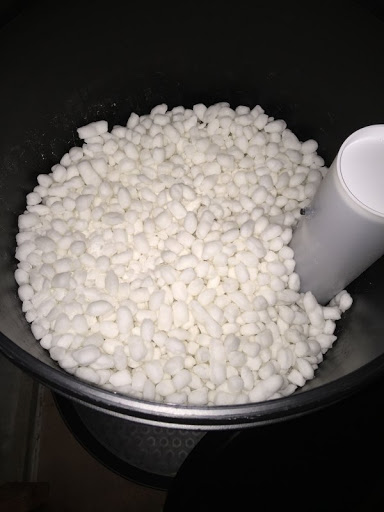
The Different Types Of Water Softener Salt
There are different types of water softener salts. Each with its advantages and disadvantages to be used as water softener salts.
Rock Salt
Rock salt consists of little rocks and pebbles. They’re the least expensive type of salt however, they aren’t as efficient.
This is because rock salt has low water solubility levels and doesn’t dissolve well in water. Rock salt has a high calcium sulfate concentration which leaves behind an excessive mineral residue.
Block Salt
As depicted by the name, block salt is a block of salt that can be submerged in your brine tank.
Water softener experts advise you to not use these blocks unless recommended by your plumber or specified in your water softener instruction manual.
If you do make use of block salt, it’s important to make sure that after submerging the block, the brine water level is above it!
Sea Salt
Sea salt is processed through the evaporation of seawater. It is also called solar salt since it’s dried out in the sun!
Sea salt is economical and has a higher solubility than rock salt. However, it can’t be used in an area of extremely hard water because of its lower efficiency.
Potassium Chloride
Potassium chloride is considered a salt-free water softener alternative. It is 99.9% sodium-free and is equally effective as a salt-based water softener.
It’s a great option for someone trying to lessen the amount of sodium chloride in their water due to high blood pressure concerns.
Water Softener Salt Buying Guide
Before buying any type of salt, make sure of the following water softener necessities:
Type of Water Softener
Don’t buy salt bags in advance only to find out you’ve purchased a salt-free water softener. Make sure you get a salt-based water softener that works through an ion exchange process.
Taste
Before getting a salt-based water softener, be prepared for the aftertaste! Salt-based softening systems swap the hard water minerals by swapping those minerals with sodium. That results in a salty taste in soft water.
Do not go for such water softeners if you suffer from preexisting health conditions!
Maintenance
It’s necessary to regularly check your water softeners to check any salt mush, salt bridges, or clogging from happening. You need to take care of your regeneration timings and salt dosage program settings, to ensure your tank is half full with enough wet salt.
This depends on the kind of salt you used and how hard your water is!
How Much Salt Do You Need?
The answer to this question is dependent on how much salt does your water softener need. This depends on how much water you use daily and how hard your water is.
Hard water can be very hard, moderately hard, or slightly hard. To figure this out you can use DIY test kits. Soft water quality depends on how much salt is added.
Extremely hard water will require triple the amount of salt as compared to slightly hard water. This is due to a higher concentration of water to turn soft.
Using general estimations you can calculate the amount of salt you need to use! On average a four-person household can use up to 10 pounds of salt when using a 40-pound salt bag. This amount is optimal for hard water, measuring 7-10 grains per gallon.
If you’re using more salt but aren’t getting softer water, here are a few reasons why:
- Extremely hard water( exceeding 10 grains per gallon)
- The water softener is conserving water but using more salt. That’ll be apparent if the water tastes too salty.
- Increased usage per day
- Increase in iron concentration level in the water
It’s important to note that your salt usage may change depending on the water softening system’s requirements.
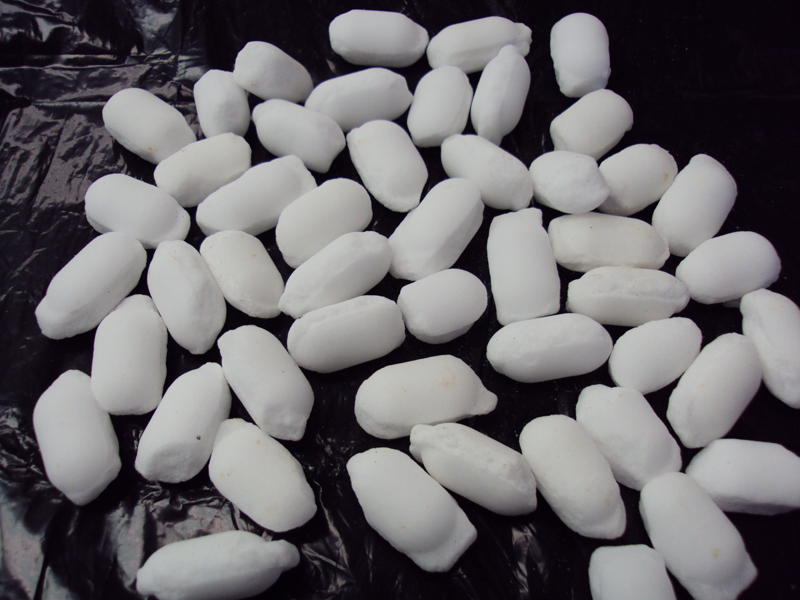
Softener Salt Vs Softener Potassium Chloride
Softener salt is also known as sodium chloride. Choosing the right type of salt depends on choosing between sodium chloride pellets and potassium chloride salt.
Sodium Chloride
You get a choice to choose from sodium chloride crystals, salt, and pellets. Since there’s a variety of choices to choose from, sodium chloride is the most common and inexpensive option.
Solar Salt
Solar salt is available in crystals and pellets. They’re made by evaporating seawater in the sun and have a higher solubility than rock salt. It doesn’t work well in extremely hard water despite its 99.6% purity level.
Evaporated Salt
Evaporated salt is available in pellets only and has the highest purity rate. This makes evaporated salt less water-insoluble. Lower water insolubility helps decrease salt clogging, mushing, and bridging.
Rock Salt
Rock salt is available in the form of pellets or rocks only. Although the most common and inexpensive option, they are the least recommended water softener salt. Rock salt cannot dissolve well in water and leaves behind massive residue signatures.
Block Salt
As in its name, block salt is a block of salt that is the least preferable option because it becomes difficult to handle and maintain.
Potassium Chloride
Potassium chloride is 99.9% sodium-free and is the best water softener salt if you want to lower your sodium intake. It functions just as well as a salt-based water softener and is a better choice for your plants and pets.
Since it’s a salt alternative, potassium chloride is more expensive than the common choice and harder to come across in your local supermarket.
Softener Crystals Vs Pellets
The form your water softener salt comes in also matters. If it was simply a matter of pouring any kind of salt, there wouldn’t be a hassle about other things.
Different water softener salt forms are for different types of water softening systems depending on average water usage and water hardness.
Softener Crystals
Softener crystals are made by leaving a mixture of brine, water, and salt out in the open to dry.
This is why they have the highest purity level making them one of the best water softener salts. This process leaves behind coarse screened crystals that have a 99.6% sodium chloride concentration.
These crystals work the best in households that have a low average water use.
Softener Pellets
Softener pellets are larger, so naturally, they are for larger households with higher water consumption. Some softener pellets include citric acid as a cleaning agent to decrease salt bridging much more effectively.
Pellets are the choice to go for if you’re a large family that goes through a high volume of water daily.
How To Clean Your Brine Tank?
Getting a water softener doesn’t only mean adding some salt once in a while. As we’ve previously mentioned, it also requires taking care of your brine tank for smooth operation.
Check the brine tank at least once every month to see the salt level. It’s pertinent that you add salt every time regeneration needs to occur.
While adding the salt, make sure that the salt level surpasses the water level by at least 4 inches but not so much that it reaches the brine tank top. There should be a 3-4 inch gap from the tank’s top.
Make sure you clear out any crusted salt clinging to the walls of the tank before you add a new pack. In case of any bridging, pouring hot water helps to get it off!
These brine tank maintenance tips will stop your problems from transgressing to the point where you’ll need professional help.
FAQ on Best Salt For Water Softener
How Much Salt Is In Sodium Chloride Water Softener Salt?
To know this you need to be aware of the level of water hardness. If you have a supply of moderately hard water, there are approximately 8 grains per gallon of sodium chloride present in softened water. This is the equivalent of 125mg of sodium intake.
Can I Use Food-Grade Salt In Water Softeners?
Another name for food-grade salt is also table salt. Table salt is composed of sodium chloride crystals as well, however, this cannot be a substitute for a water softener salt. This is because table salt crystals are fine and minute in size. Water softening systems need larger crystals or pellets for getting the job done properly. If you were to use food-grade salt, this will make your water softening unit more susceptible to salt mushes, bridges, and clogging.
Diamond Crystal Vs Morton Water Softener Salt: Which One Is Better?
Both Diamond Crystal and Morton are top favorites as depicted by customer reviews. Morton has a wide variety of salts including evaporated salt pellets, potassium chloride, or normal salt pellets. They are great to remove buildup on any appliance or pipe because of their patented formula which you can’t miss on! With a wide variety and cheap prices, Morton salt products are hard to pass.
Diamond Crystals, however, are also at the top of their game with their NSF-certified salt. Their salt pellets and crystals don’t only guarantee a decrease in scaling but also increase your appliances’ lifespan.
Both companies are a great choice, but you should gravitate towards the cheaper option with all the qualities.
Can I Use Pool Salt For Water Softener?
It seems like a viable option but it’d be best to not use it. Pool salt is not equipped to be used as water softener salt, which won’t let the water flow as freely. Pool water is extremely salty as well because it retains the brine present in the tank leaving a strong salty taste.
Check out the full list of FAQs for water softener salt.
